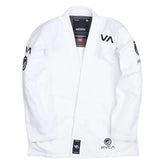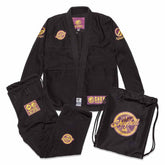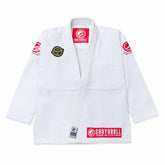10 Things to Never Consume Before BJJ: Foods, Drinks & Alcohol That Can Ruin Your Roll
Brazilian Jiu Jitsu (BJJ) demands more than just strength and skill. It requires mental sharpness, stamina, and physical readiness. Whether you train in a Gi or No-Gi, what you consume before stepping on the mat can make or break your performance. If you have ever felt sluggish, bloated, or dizzy during rolls, chances are your pre-training meal or drink was the culprit.
In this article, we reveal the 10 things you should never consume before BJJ. In this way, you can train harder, recover faster, and optimize your performance. From sneaky food traps to hydration mistakes and alcohol myths, these nutrition tips are essential for every Brazilian Jiu Jitsu practitioner.
If you are serious about improving your game and protecting your body, this guide is for you.
1- Greasy Fast Food
- Why it’s bad: Burgers, fries, and fried chicken might seem tempting on your way to the academy. But greasy fast food is a major energy killer. High in saturated fats and sodium, these foods are slow to digest. Thus, causing bloating and sluggishness.
- Impact on BJJ: You will feel heavy, slow, and more prone to gas or cramps during your rolls. The last thing you want is to feel like a brick during sparring.
- Better option: Go for a light, lean protein with complex carbs like grilled chicken and brown rice 2-3 hours before training.
2- Carbonated Drinks (Soda or Sparkling Water)
- Why it’s bad: Fizzy drinks fill your stomach with gas. Hence, leading to bloating and discomfort—two things that do not mix well with grappling.
- Impact on BJJ: The compression during drills and rolling (especially in closed guard or mount) can make you feel nauseous and full.
- Better option: Stick to flat water or an electrolyte drink with no carbonation.
3- Alcohol
- Why it’s bad: Alcohol is a diuretic and a depressant, meaning it dehydrates you and slows down cognitive function. Even a small amount of alcohol a few hours before class can impair judgment and reaction time.
- Impact on BJJ: Poor coordination, slow reflexes, and decreased stamina—all dangerous on the mat. You are also at a higher risk of injury.
- Better option: Save the drinks for after class or post-competition celebration.
4- Heavy Dairy Products
- Why it’s bad: Cheese, whole milk, and creamy yogurts are high in fat. Such products can cause digestive distress, especially for those who are lactose intolerant.
- Impact on BJJ: Cramping, bloating, and gas can make grappling incredibly uncomfortable. Also, dairy slows digestion, which may leave you feeling heavy.
- Better option: If you must have dairy, choose light options like lactose-free Greek yogurt and eat it 2+ hours before training.
5- Energy Drinks
- Why it’s bad: While they might give a quick burst of energy, energy drinks are loaded with sugar and caffeine. This can lead to a spike and then a sharp crash.
- Impact on BJJ: You might feel jittery at the start and fatigued midway through the session. Dehydration and heart palpitations are also concerns.
- Better option: Try natural caffeine like green tea or a small black coffee 1 hour before training.
6- High-Fiber Foods (Beans, Lentils, Broccoli)
- Why it’s bad: These are healthy foods—but not ideal before rolling. High-fiber foods take time to digest and can cause bloating and gas if eaten too close to class.
- Impact on BJJ: You may find yourself uncomfortable during positional sparring or scrambles, and excessive bloating can hinder your movement.
- Better option: Eat high-fiber meals at least 3–4 hours before training or save them for post-training recovery.
7- Large Meals Before Class
- Why it’s bad: Eating too much—even healthy food—right before training forces your body to prioritize digestion over performance. Blood flow gets diverted to your gut, not your muscles.
- Impact on BJJ: You will feel lethargic, weighed down, and possibly nauseous during high-intensity rolls.
- Better option: Have a small, balanced meal (like a banana and peanut butter or oatmeal with berries) 1-2 hours before class. Eat your large meal post-training.
8- Candy and Sugary Snacks
- Why it’s bad: High-sugar snacks like candy bars, donuts, or pastries might seem like a quick energy fix. But they lead to insulin spikes and rapid crashes.
- Impact on BJJ: You might start strong but run out of gas quickly. Sugar can also cause inflammation, which slows down recovery and worsens soreness.
- Better option: Opt for complex carbs like a banana, dates, or whole-grain toast with almond butter.
9- Spicy Foods
- Why it’s bad: Spicy meals—think chili, curry, or extra hot wings—can irritate your digestive system. Heartburn, acid reflux, or even stomach cramps can follow.
- Impact on BJJ: You do not want to be mid-roll and feel like your stomach’s on fire. It is distracting and uncomfortable.
- Better option: Keep spices mild before training and enjoy your spice kick after class when your digestive system isn’t under pressure.
10- Too Much Water Right Before Class
- Why it’s bad: Yes, hydration is crucial. But chugging water right before class can lead to a sloshy stomach and even nausea, especially during warmups or inversions.
- Impact on BJJ: Full stomach, frequent bathroom trips, and discomfort while rolling upside-down or during drills.
- Better option: Hydrate consistently throughout the day and sip lightly 30 minutes before class. Use electrolyte-rich water if you’re sweating a lot.
Additional Pro Tips for Pre-BJJ Nutrition
Timing Is Everything
- 2-3 hours before training: Have a balanced meal with protein, carbs, and healthy fats.
- 1 hour before class: Light snack like a banana, protein bar, or small smoothie.
- 15 minutes before class: Just water or a small sip of natural pre-workout.
What to Eat Instead
- Ideal pre-BJJ foods include:
- Oatmeal with banana and honey
- Grilled chicken and sweet potato
- Rice and lean ground turkey
- Eggs and whole-grain toast
Why Pre-BJJ Nutrition Matters
It does not matter if you are in Gi training preparing for your next IBJJF tournament or just attending an open mat. Your fuel is everything. Brazilian Jiu Jitsu is a physically demanding martial art. It involves explosive movement, isometric tension, and mental calculation. Poor nutrition can not only sabotage your rolls but increase your chances of injury.
Athletes serious about progress in BJJ must view their diet as part of their training regimen, not separate from it.
Guide > Keto Diet for BJJ
Final Thoughts
Avoiding the wrong foods and drinks before BJJ class is just as important as showing up in a clean BJJ Gi and ready mindset. What you eat affects how you perform, recover, and progress. Keep this ten dietary don’ts in mind and build a routine that fuels your rolls—not ruins them.
Train smart, eat right, and dominate the mat.
Need high-quality BJJ Gi, No-Gi rash guards, or competition apparel? Check out Novakik Bjj latest collection built for serious grapplers who train hard and eat smart.







